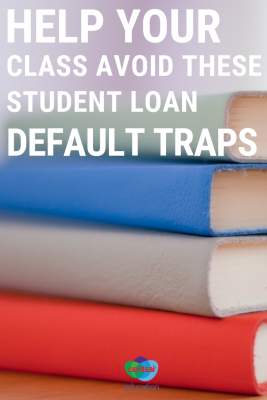CEE Standard: Using Credit
Many students will be looking at taking out student loans to help them pay for college. Now is the time to teach them everything they need to know about student loans. In this article, they will learn how to avoid defaulting on their loans and what that means.

When I graduated from college, I did not know about student loan default. I did know that I’d have to pay back my student loans. The problem? I didn’t have a clue how much I owed, nor did I know how to go about paying them back.
You see, all throughout college I buried my head in the sand. Paying off debt was something I’d do “later.” As an 18-year-old just entering college, it’s hard to get a firm understanding of exactly what your student loans entail. Once you graduate — even with exit counseling — you may still be clueless.
So, whether you are a college student with student loans, a recent graduate, or currently paying back your student loans, there are key things you should know.
Your Loan Servicer
When it was time to make my first payment on my student loan, I scrambled. “Wait, who do I pay this to?” I wondered.
After the initial confusion, I was able to get the information I needed from the National Student Loan Data System. You will need to have a Federal Student Aid (FSA) ID to log in.
Knowing who your loan servicer is super important. I was confused because I didn’t realize that my lender and my loan servicer were two different entities.
Realizing that distinction, I was able to find my loan servicer and to come up with a repayment plan. Knowing your loan servicer is crucial so you can make on-time payments.
If you are having trouble making payments, make sure you stay in touch with your loan servicer to discuss options.
Federal or Private?
When you are in school you probably don’t think much about your student loans. I didn’t! However, not all loans are created equal, as there are stark differences between federal student loans and private student loans.
Federal student loans are administered by the government and offer protections such as income-based repayment and forgiveness. Private loans tend to have stricter repayment terms and could have higher interest rates.
You can typically find this information by knowing who your lender is. Federal loans are backed by the government, while private loans are made by banks, credit unions, etc.
Interest Rate
Interest can be the gift that keeps on giving.
Your interest rate will determine how much extra money is tacked onto your principal balance. It’s important to know your interest rates, so you can calculate how much you will be paying for your debt over time.
For example, I borrowed $18,000 for my undergraduate degree, but it ballooned to over $23,000 because of interest. I hadn’t really thought of how interest would affect my overall balance.
My graduate PLUS loans were at a much higher interest rate, so I paid off those first. My undergraduate loans were at a low rate of 2.3 percent, whereas my graduate loans were between 6.8 and 7.9 percent.
To check the most up-to-date interest rate on your student loan go to the Federal Student Aid website. Interest rates are set by the federal government and affect your overall repayment.
For example, if you take out $35,000 in student loans and pay it back over 10 years at a 4 percent interest rate, you’ll pay $7,522.96 in interest. If your interest rate is higher by just 1 percent, that is, 5 percent, you will end up paying $9,547.52 in interest. That’s a huge difference, so it’s important to understand your interest rate and how much it will cost you.
Your Repayment Plan
Once you graduate college and complete exit counseling, it’s time to set up a repayment plan. Most loan servicers automatically sign you up for a Standard Repayment Plan, unless you request another plan.
Paying off your loans in 10 years or less is great — but if you are struggling, you may want to apply for Income-Based Repayment. Opt for a shorter plan if you can, but utilize the longer options if necessary.
Student Loan Default
You may think that not paying back your student loans is not a big deal. But if you stop paying your loans and they go into default, you could be headed toward serious trouble.
If you, the borrower, fail to make a payment after 270 days, your loans will enter default. Your loans will then be due immediately and will be sent to a collection agency. From there, the agency can tack on more fees and also report your payment as delinquent, which will severely hurt your credit score.
Also, your wages could be garnished and so can your income tax refund. Pretty serious stuff, huh?
If you are having trouble paying, it’s crucial that you get in touch with your loan servicer immediately. You can also look into Public Service Loan Forgiveness as well as other forgiveness programs.
The Bottom Line
Truly understanding your student loans and managing them effectively is crucial. Student loans can be a burden and affect various areas of your life. Create a repayment plan, get the debt off your back, and be happy.
- Do you have any idea how much money you might need to borrow to pay for school?
- Would you prefer your loans to be federal or private? What is the difference between the two?
- What is an interest rate and how does it affect your loan?
- What is your plan to repay your loans?
- What is student loan default?

